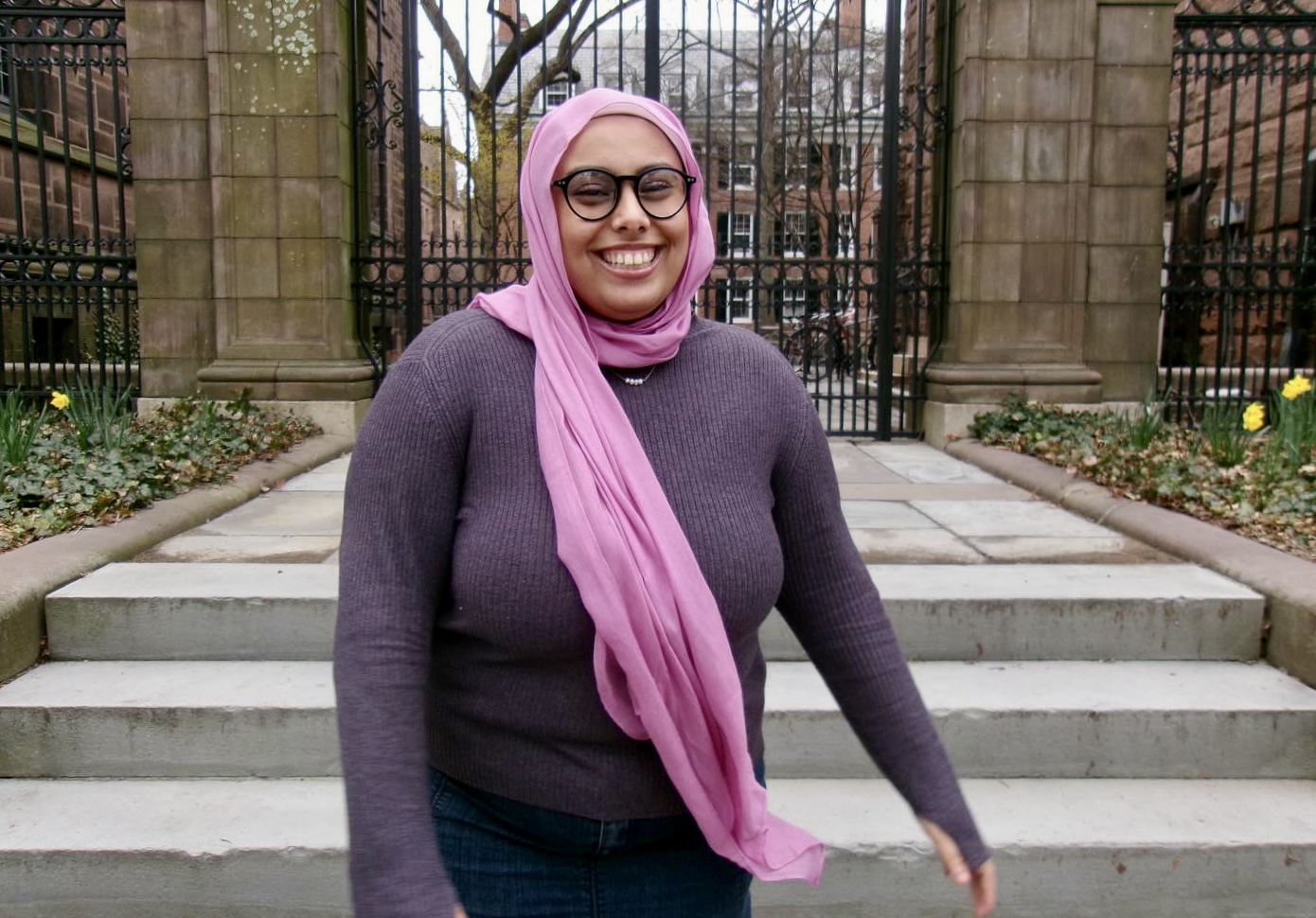© Rachel Peet
For 18-year-old Reem, a recent high school graduate, the daily ritual of pinning up her hijab, clasping her Iraq-shaped necklace, and draping her black and white keffiyeh over her shoulders has brought her closer to a sense of freedom than ever before.
Having been a refugee from Iraq and Syria, Reem understands that freedom can feel very distant for the “caged birds” in our migrant community. Her familiarity with the apprehensive voices experienced by many refugees and people of color has inspired her to study Human Rights at the University of Connecticut this fall.
Reem’s journey of advocating for human rights began with her connection to IRIS. She was only four years old when she, her younger sister, and her mother arrived in the States in 2009 to seek a safer and more hopeful life. Initially, IRIS provided financial aid and resettlement support for her family and extended relatives. By 2015, when her aunts, uncles, and grandmother arrived to reunite with them through IRIS —a vivid and unforgettable memory for Reem—she was well on her way to resisting the systemic barriers around her. The reconnection with her youngest aunt was especially inspiring.
In the following years, the bond between Reem and her aunt strengthened through their involvement with the Youth Leadership group as IRIS. This group of immigrant and refugee women met once a week to explore leadership activities as they navigated their first years in the States. Some of Reem’s cherished memories from the group include local field trips to nearby museums, the New Haven Public Library, and Hammonasset Beach, during which they learned about the local history and impact on immigrant populations over time, especially migrants of color in New Haven.
One of the most memorable workshops from Reem’s time with the Youth Leadership group was an introduction to the history of the Black Panther Party (BPP). As they carried old photographs around and from downtown New Haven, Reem and her friends were transported back to the 1960s and 70s, when the Black Panthers sought to protect and liberate long-discriminated Black neighborhoods. As an aspiring photographer, Reem was struck by the lack of change between these historical images and the present view, which fueled her passion for advocating for human rights. Inspired by Malcolm X and the BPP’s slogan, she felt a strong need to create “Freedom by any means necessary” for the greater good of the global migrant community.
Throughout her sophomore and junior years of high school, Reem emerged as a pioneer for the Youth Leadership group. She planned numerous lessons on social justice, racism, and other contemporary issues, opening up her perspective and those of her peers. One of her favorite lesson plans highlighted the evolution of women’s suffrage and its correlation to present day women’s rights. Reem’s exposure to IRIS were seeds that would eventually flourish her enthusiasm for social justice, particularly at her school, Wilbur Cross High School.
In her final years of high school, Reem participated in multiple protests for oppressed populations and even organized a student-led walk-out within the New Haven Public School system. The walk-out in May of 2022 involved more than 600 students protesting against School Resource Officers (SRO’s) and their discriminatory actions towards students of color and their rights to freedom of speech.
“It was really cool marching in the streets alongside people who have similar perspectives and drive. It’s an indescribable feeling. You’re so present with all the passionate emotions of all those who are involved,” Reem said.
Even within the walls at Wilbur Cross High School, Reem grew impassioned as a social justice advocate. Her favorite course studied African American and Latinx cultures and history in the United States. The passion of her teacher motivated her to delve deeper into human rights and social justice through her involvement in school clubs such as Student Council, The Proclamation (the student newspaper), and the National Honors Society.
As Reem recognizes the cyclical and stark connections between past and present injustices, she has started to reconnect with her Middle Eastern culture, family, and beliefs. Just last summer in 2023, Reem decided to start wearing her hijab. With her aunt being a source of support in her life, Reem looked to her for guidance in making such a big decision.
“When I was deciding my hijab journey, she was a huge help in really emphasizing that it was my personal decision and no one else’s. She reminded me that if I choose to wear my hijab, it was a decision only between myself and Allah, just like any other decision. There’s no need to listen to others and do what they say or want. She’s one of my greatest inspirations in life,” Reem shared.
As an Iraqi-American who often feels like she’s living two lives in the States, the ability to make such choices for herself has brought Reem greater freedom. It’s the choice to wear her hijab, to speak more Arabic with her loved ones, to carry her keffiyeh across her shoulders every day, to celebrate Islamic holidays like Ramadan, and to embrace her Middle Eastern roots. This is what sets Reem free, allowing her to share her voice with the ever-evolving melting pot of cultures in America. The blend of experiences with IRIS, her aunt, her high school education, and the influence of social justice poets like Maya Angelou and Refaat Alareer have all contributed to the amplification of her own words. In a recent senior speech reflecting on Alareer’s “If I Must Die” poem, Reem shared the following:
“He teaches me to never be silenced by anyone and to speak my truth even if no one in the room agrees with me or has the confidence to speak up. He teaches me to wear my keffiyeh, hijab, and Iraqi necklace with pride in every space I step foot in. I am proud of my brown skin that gleams in the sun. I am proud to be born in Iraq. I am proud to be a refugee. Generations behind me in my footsteps to future endeavors. I shine everywhere I go. I am a woman who is not afraid of death. I want my life to be remembered – to be told at family gatherings, at a graduation speech. To never be erased.”
Reem is proud to toss her graduation cap as she embarks on yet another transformative chapter with her hijab freely flowing in the breeze.



